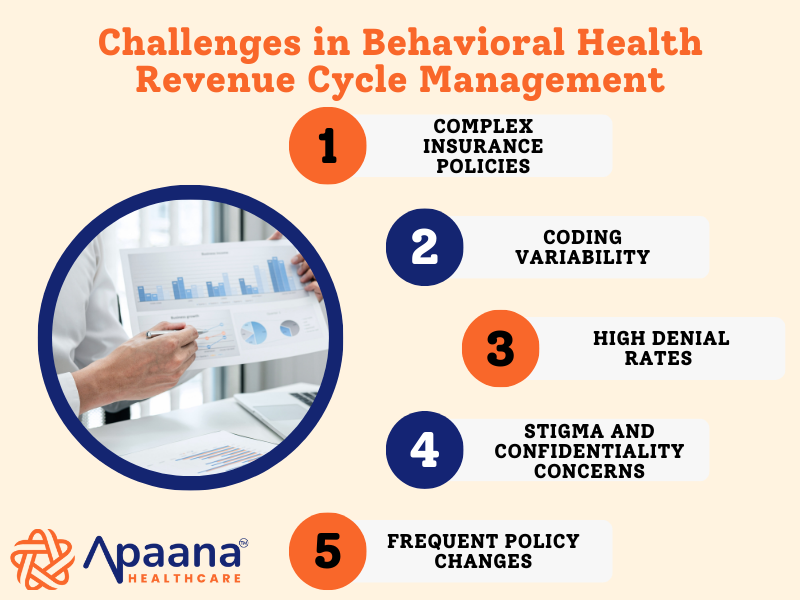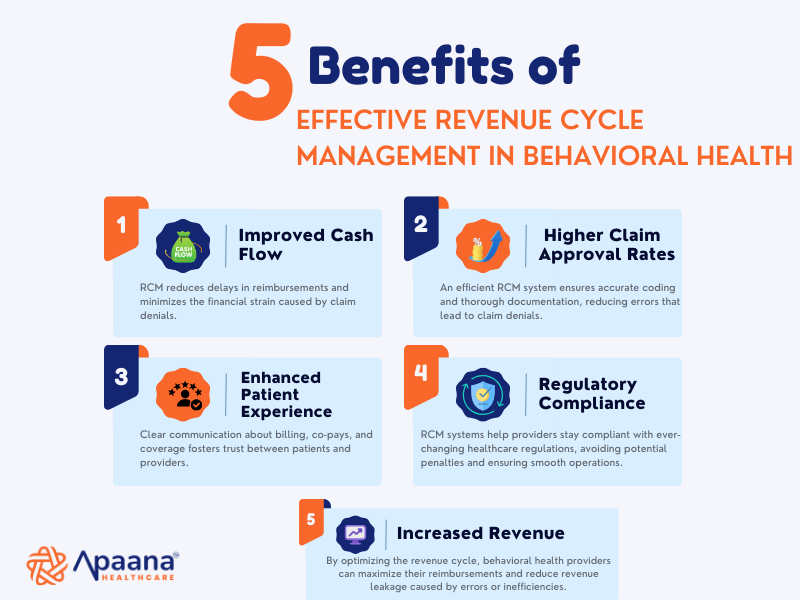Behavioral health services play a critical role in addressing mental health issues, substance use disorders, and other psychological challenges. However, managing the financial side of behavioral health practices is equally important to ensure their sustainability and effectiveness. This is where Revenue Cycle Management in Behavioral Health becomes a cornerstone of success. By streamlining billing processes, minimizing errors, and ensuring timely reimbursements, revenue cycle management (RCM) helps behavioral health providers maintain financial stability while focusing on delivering quality care.
In this blog, we’ll explore the significance of Revenue Cycle Management in behavioral health, the challenges unique to this field, and how an effective RCM system can benefit both providers and patients.
What is Revenue Cycle Management in Behavioral Health?
Revenue Cycle Management (RCM) encompasses the financial processes involved in managing a healthcare provider’s revenue flow, from patient registration to the final payment. In behavioral health, RCM ensures that providers get paid for their services accurately and promptly. It involves tasks such as:
- Verifying patient insurance and benefits.
- Submitting accurate claims to insurance providers.
- Managing claim denials and appeals.
- Handling patient billing and collections.
Due to the complex nature of behavioral health billing, which often involves varying treatment durations, multiple providers, and specific insurance requirements, RCM becomes even more critical in this field.
Challenges in Behavioral Health Revenue Cycle Management
Behavioral health providers face unique challenges that can complicate revenue management. These include:

1. Complex Insurance Policies
Behavioral health services often fall under different insurance coverage rules compared to general medical care. Insurance providers may impose limits on the number of sessions or require pre-authorization for specific treatments, making billing more complicated.
2. Coding Variability
Behavioral health codes can be nuanced, with slight variations significantly affecting reimbursement rates. Incorrect coding often leads to claim denials or underpayments, affecting revenue.
3. High Denial Rates
Claim denials in behavioral health are higher compared to other specialties. This is due to factors like incomplete documentation, errors in patient information, or non-compliance with payer-specific requirements.
4. Stigma and Confidentiality Concerns
Maintaining patient confidentiality is paramount in behavioral health, which can add layers of complexity to billing and documentation processes.
5. Frequent Policy Changes
Government regulations and insurance policies related to mental health services frequently change, requiring providers to stay updated to avoid compliance issues and revenue disruptions.
Benefits of Effective Revenue Cycle Management in Behavioral Health
Implementing a robust RCM system offers numerous benefits for behavioral health practices, enabling them to focus on patient care without compromising financial stability.

1. Improved Cash Flow
Timely and accurate billing ensures consistent cash flow, which is vital for the day-to-day operations of any healthcare provider. RCM reduces delays in reimbursements and minimizes the financial strain caused by claim denials.
2. Higher Claim Approval Rates
An efficient RCM system ensures accurate coding and thorough documentation, reducing errors that lead to claim denials. It also includes a process for quickly addressing and resubmitting denied claims.
3. Enhanced Patient Experience
Clear communication about billing, co-pays, and coverage fosters trust between patients and providers. A streamlined billing process also reduces confusion and stress for patients.
4. Regulatory Compliance
RCM systems help providers stay compliant with ever-changing healthcare regulations, avoiding potential penalties and ensuring smooth operations.
5. Increased Revenue
By optimizing the revenue cycle, behavioral health providers can maximize their reimbursements and reduce revenue leakage caused by errors or inefficiencies.
Key Components of Revenue Cycle Management in Behavioral Health
To reap the full benefits of RCM, behavioral health practices must focus on the following components:
1. Patient Registration and Verification
Accurate patient information is the foundation of successful RCM. Verifying insurance coverage and obtaining necessary pre-authorizations during patient registration minimizes errors and claim rejections later.
2. Accurate Coding and Documentation
Proper documentation of services rendered, along with precise coding, ensures that claims are submitted accurately. Behavioral health practices should invest in staff training or partner with experts in medical coding to avoid costly errors.
3. Claims Submission and Management
Timely submission of claims is crucial for maintaining cash flow. RCM systems should include tools for tracking claims, identifying errors, and resubmitting denied claims promptly.
4. Patient Billing and Collections
Clear and transparent billing processes help patients understand their financial responsibilities. Automated reminders and payment portals can streamline collections and reduce outstanding balances.
5. Data Analytics and Reporting
Analyzing revenue data helps identify trends, inefficiencies, and areas for improvement. Advanced RCM systems offer reporting tools that enable providers to make informed decisions about their financial strategies.
The Role of Technology in Behavioral Health Revenue Cycle Management
Technology plays a transformative role in enhancing RCM for behavioral health. Advanced RCM software can automate repetitive tasks, improve accuracy, and provide real-time updates on claims and payments. Key technological solutions include:
1. Electronic Health Records (EHR)
Integrating EHR systems with RCM software ensures seamless data sharing, reducing errors and improving efficiency.
2. Automated Coding Tools
Automated tools help streamline the coding process, ensuring accuracy and reducing the time spent on manual entry.
3. Analytics Platforms
Analytics tools provide actionable insights into revenue trends, helping providers identify and address inefficiencies in their RCM processes.
4. Patient Portals
Online portals allow patients to access billing information, make payments, and communicate with providers, enhancing the overall experience.
Choosing the Right RCM Partner for Behavioral Health
Given the complexities of behavioral health billing, partnering with a professional RCM service provider can make a significant difference. An experienced RCM partner can:
- Ensure compliance with industry standards and regulations.
- Optimize the claims process for faster reimbursements.
- Provide expert support for handling denials and appeals.
- Offer tailored solutions for the unique needs of behavioral health practices.
Apaana Healthcare: Your Trusted Partner in Revenue Cycle Management
At Apaana Healthcare, we understand the unique challenges faced by behavioral health providers. Our comprehensive RCM solutions are designed to drive operational excellence, ensuring seamless billing and payment processes.
Why Choose Apaana Healthcare?
- Global Expertise: We specialize in healthcare management solutions, serving clients across diverse healthcare settings.
- Comprehensive Services: From member enrollment to claims administration, medical billing & coding, and provider engagement, we offer end-to-end support.
- Cost-Effective Solutions: Our outsourced services help reduce operational costs while improving financial outcomes.
- Tailored Support: We adapt our services to meet the specific needs of behavioral health providers, ensuring maximum efficiency and compliance.
Partner with Apaana Healthcare to streamline your revenue cycle management and focus on what truly matters – delivering exceptional care to your patients.
Conclusion
Revenue Cycle Management in Behavioral Health is not just about managing finances; it’s about creating a system that supports the overall well-being of patients and providers alike. By addressing the unique challenges of behavioral health billing, implementing efficient processes, and leveraging technology, providers can ensure financial stability while enhancing patient satisfaction.
With Apaana Healthcare as your RCM partner, you can trust us to handle your financial processes with precision and care. Let us help you achieve operational excellence and build a thriving behavioral health practice.





